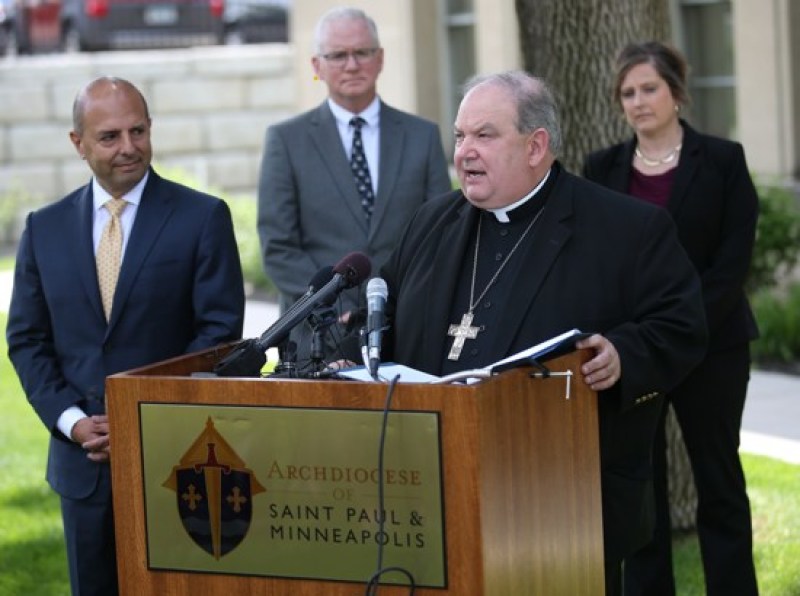
The Archdiocese of Saint Paul & Minneapolis recently published the plan to permit parishes to reopen services to the public masses and defy the state's "stay-home" order that forbids religious gathering of more than ten people.
According to the announcement made by Catholic Bishops of Minnesota, a statement signed by Minnesota's six Catholic bishops as well as the diocesan administrator of the Diocese of Duluth, they are giving parishes permission to resume the public celebration of Mass on Tuesday, May 26, hoping it will give them time to prepare for the Pentecost celebration coming on May 31.
The letter from @ArchbishopHebda and the Catholic bishops of Minnesota regarding limited return to public Mass may also be found here: https://t.co/6V84Svu2KP
"” Archdiocese SPM (@ArchdioceseSPM) May 20, 2020
Bishops mentioned that they have attempted to work collaboratively with the Walz Administration with reopening the parishes by "seeking the guidance of the Department of Public Safety and the Department of Public Health to help us strengthen our specific safety protocols based on the statewide plan." But they are disappointed that in Governor Walz's May 13 announcement, "he would end the Stay-at-Home order to allow more commerce but prohibit religious gatherings of more than ten people," an order that "defies reason,"
The letter notes that both the Catholic hierarchy and "some Lutheran colleagues" submitted a joint plan to the Governor on May 8 detailing their sanitation measures and proposing a cap on church attendance limited to 33 percent of building capacity, a plan that the governor rejected.
While they will be defying the governor's order, they will be maintaining precautions set on a high standard by limiting attendance and keeping proper sanitation protocols.
"Parishes will be required to follow the strict protocols we have published for sanitation and social distancing and will have to limit attendance to one-third of the seating capacity of the church," they state. "No one will be obliged to attend, as the bishops of Minnesota will continue to dispense from the obligation to attend Sunday Mass."
The bishops affirm their unanimous "conviction" that they can safely resume public Masses in accordance with both our religious duties and with accepted public health and safety standards.
The letter further notes that while Catholic parishes in Minnesota have permission to reopen for worship on May 26, none is obliged to do so. It also states that the bishops have encouraged those most at risk to stay home.
The statements also mention the importance of the parishes during this time of hardship and why they are essential during the pandemic.
"Given our willingness to coordinate with the Governor, we are especially disappointed that his most recent order (20-56) does not address both the vital importance that faith plays in the lives of Americans, especially in this time of pandemic, and the fundamental religious freedom possessed by houses of worship that allows our country to thrive."
"The human cost to this pandemic has been extraordinary, not just in terms of lives lost to the virus but the rapidly growing problems of job loss, depression, crime and violence, and substance abuse. As Pope Francis has said, the church must be a field hospital, ministering to all, but especially the poor and vulnerable. He has cautioned that overly drastic measures that limit church life will have a disproportionate impact on "the little ones" and those who have no one to rely on."
The bishops conclude their letter with a section on the respective rights and responsibilities of civil government and Church leaders, noting that the decision to suspend parish activities, Catholic schools, and the public celebration of Mass was made by the bishops themselves prior to any executive orders by the governor.
"Our decision to suspend the public celebration of Mass was painful," they add. "We made that decision not because we were compelled to do so, but because we judged that the circumstances required it. We believe that those circumstances have changed, as confirmed by the Governor's decision to end the Stay-at-Home order and allow more commerce. "With the reopening of shopping malls and other establishments, "how can reason require us any longer to keep our faithful from the Eucharist?" they ask.
"We are blessed to live in a nation that guarantees the free exercise of religion," they state. "This right can only be abridged for a compelling governmental interest, and only in a way that is narrowly tailored to be the least restrictive means of achieving the desired end. "We think that the executive order issued last Wednesday fails this test. An order that sweeps so broadly that it prohibits, for example, a gathering of 11 people in a Cathedral with a seating capacity of several thousand defies reason," they add.
"Therefore, we have chosen to move forward in the absence of any specific timeline laid out by Governor Walz and his Administration," they state. "We cannot allow an indefinite suspension of the public celebration of the Mass."



















